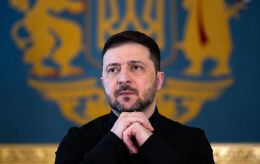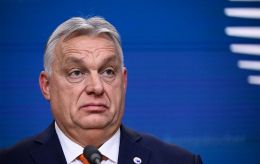Ukraine's NATO bid fails due to German-American opposition - media
 Ukraine failed to achieve desired outcomes at the NATO summit due to alleged German's pressure on the USA.
Ukraine failed to achieve desired outcomes at the NATO summit due to alleged German's pressure on the USA.
Ukraine failed to achieve desired outcomes at the NATO summit in Vilnius due to pressure from Germany on the United States, according to Newsweek.
The source in the Ukrainian government claims that the German-American opposition prompted President Volodymyr Zelenskyy to call the talks during the summit "absurd."
The wording of NATO communiqués, which are published during or after the summit, is carefully crafted by diplomats over a considerable period. Therefore, by the time the leaders of countries meet, almost all the content of the communiqué is already agreed upon.
Before the summit, U.S. President Joe Biden and German Chancellor Olaf Scholz made it clear that they did not want to risk a direct NATO conflict with Russia by inviting Ukraine to join the Alliance in the midst of the war.
According to an anonymous source, Ukraine insisted on specific wording in the communiqué, emphasizing that the assistance provided to the country would not substitute for membership. Scholz and French President Emmanuel Macron agreed to this proposal. However, the White House opposed it, apparently under pressure from Berlin.
The source also added that the initial NATO position regarding Ukraine in the communiqué was weaker, as it did not include " membership " or "NATO."
According to Ukraine's Deputy Prime Minister for European and Euro-Atlantic Integration of Ukraine, Olha Stefanishyna, the summit "positively surprised" Ukraine since allies made it clear that Kyiv would sit at the table as an equal partner. However, there were still "negative emotions" surrounding the wording of the communiqué.
Stefanishyna stated, "They were not entirely clear on the issues related to the invitation," adding that the problem "lies in the fact that one of the allies effectively put Putin at the negotiating table" and created ambiguous conditions for Ukraine's accession. She did not name the country but mentioned she was not disappointed with the behavior of the United States or France.
Oleksandr Merezhko, a member of the Ukrainian parliament and the head of the committee on foreign affairs, said that Berlin remains one of Ukraine's most hesitant supporters, fearing Russia. He urged German colleagues to acknowledge the mistake they made during the Bucharest summit and rectify it. However, he received no response.
"But Biden's White House is also heavily invested in America's relationship with Germany. Repairing the damage done to Washington-Berlin ties by his predecessor, President Donald Trump, was a prime foreign policy goal for the Biden administration. Some in Kyiv are now concerned the White House will prioritize German comfort over theirs," the article says.
Responding to whether Kyiv feels a consensus regarding its membership goal, Stefanishyna confirmed it 100%, attributing this certainty to the transformation of President Zelenskyy during the two-day summit. She also outlined three main messages from the series of meetings at the summit:
- no one will pressure Ukraine regarding the conditions for ending the war, and NATO integration will not be used as speculation,
- Ukraine will become a member of NATO,
- security guarantees, which were deemed a "major achievement," will not replace the membership process.
NATO summit in Vilnius
The NATO summit, held from July 11 to 12, focused on Ukraine as a central topic. The NATO member countries agreed on a joint communiqué aimed at advancing Ukraine's integration. The key points include a multi-year assistance program for Ukraine, the creation of the Ukraine-NATO Council, and removing the precondition for completing the Membership Action Plan (MAP).


